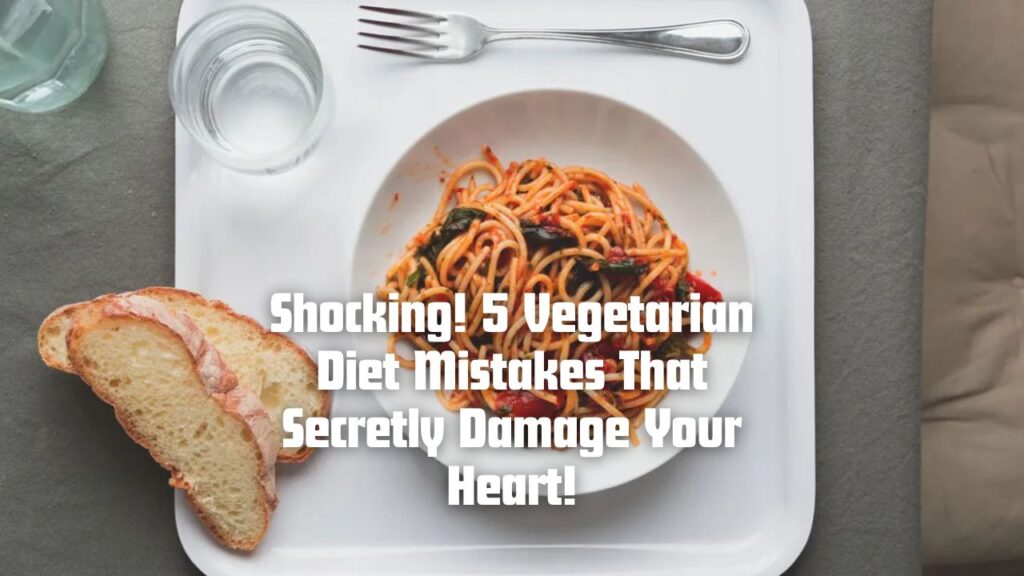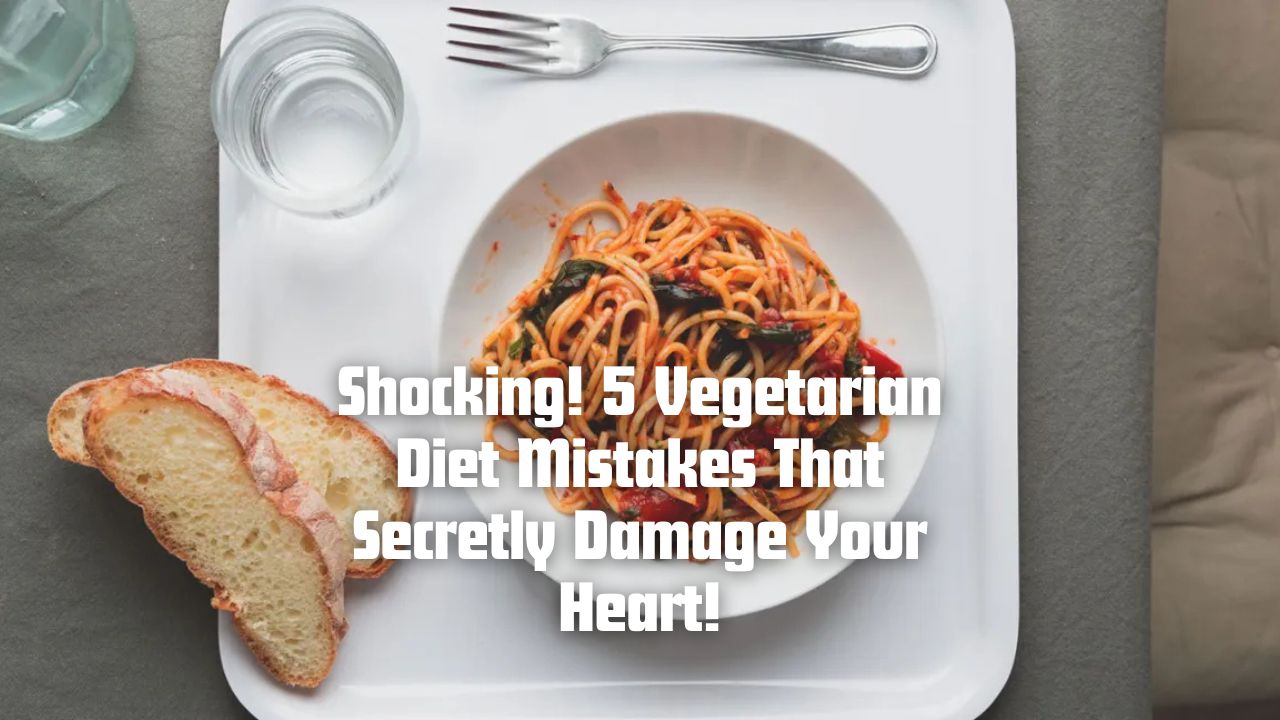Top 5 Mistakes Vegetarians Make That Harm Their Heart Health
Many people choose a vegetarian diet because they believe it is healthier. While a plant-based diet has many benefits, it is not always heart-healthy if not followed properly. Some common mistakes can harm your heart health instead of improving it. Here are the top five mistakes vegetarians make that can damage their hearts.
1. Eating Too Many Processed Vegetarian Foods
Many people think that just because a food is vegetarian, it is healthy. This is not true! Many processed vegetarian foods are high in unhealthy fats, added sugars, and artificial ingredients. These can increase the risk of heart disease, high cholesterol, and obesity.
Examples of Unhealthy Processed Vegetarian Foods:
- Veggie burgers (if high in sodium and preservatives)
- Instant noodles
- Vegetarian frozen meals
- Packaged snacks like chips and cookies
- Flavored yogurt with lots of added sugar
These foods often contain trans fats and refined carbs, which can raise bad cholesterol (LDL) and increase inflammation in the body. Instead, choose whole foods like fresh vegetables, whole grains, and nuts. Always check the nutrition label before buying packaged vegetarian products.
2. Not Eating Enough Protein
Many vegetarians do not get enough protein, which is essential for muscle health, metabolism, and heart function. If you do not eat enough protein, your body may break down muscle tissue, including the heart muscle.
Common Signs of Protein Deficiency:
- Feeling weak or tired
- Hair loss
- Slow wound healing
- Frequent infections
Some vegetarians rely too much on carbs like rice, pasta, and bread but forget about protein sources. If you don’t get enough protein, your heart health may suffer.
Best Vegetarian Protein Sources:
- Lentils and beans
- Chickpeas and hummus
- Tofu and tempeh
- Quinoa
- Nuts and seeds
To protect your heart, make sure every meal includes a good source of protein.
3. Consuming Too Much Dairy and Cheese
Many vegetarians eat a lot of dairy products, especially cheese, butter, and cream. These foods are high in saturated fats, which can raise bad cholesterol and increase the risk of heart disease.
High-Fat Dairy Products to Avoid or Limit:
- Full-fat cheese
- Butter
- Cream-based sauces
- Ice cream
Healthier Dairy Alternatives:
- Low-fat yogurt or Greek yogurt
- Plant-based milk like almond, soy, or oat milk
- Nutritional yeast (a cheese alternative)
Eating too much dairy can also lead to weight gain, which puts more stress on the heart. It is important to balance dairy intake and include more heart-friendly fats like those from avocados, nuts, and olive oil.

4. Eating Too Many Refined Carbs and Sugary Foods
Many vegetarians eat a diet high in refined carbs like white bread, white rice, pasta, and sugary snacks. These foods cause blood sugar spikes, increase inflammation, and raise the risk of heart disease.
Unhealthy Refined Carbs and Sugary Foods:
- White bread and white rice
- Sugary cereals
- Pastries and cookies
- Soft drinks and fruit juices with added sugar
When you eat too many refined carbs, your body converts them into fat, leading to obesity and diabetes, which are major risk factors for heart problems.
Healthy Carb Alternatives:
- Whole grains like brown rice, quinoa, and whole wheat bread
- Legumes and beans
- Sweet potatoes instead of white potatoes
- Fruits in moderation instead of sugary snacks
Choosing whole, unprocessed carbs will help protect your heart health.
5. Not Getting Enough Omega-3 Fatty Acids
Many vegetarians lack omega-3 fatty acids, which are essential for heart health. Omega-3s help reduce inflammation, lower blood pressure, and improve cholesterol levels. Since most omega-3s come from fish, vegetarians need to find plant-based sources.
Symptoms of Omega-3 Deficiency:
- Dry skin
- Depression or mood swings
- Poor memory and concentration
- Joint pain
Best Vegetarian Sources of Omega-3s:
- Chia seeds and flaxseeds
- Walnuts
- Hemp seeds
- Algal oil (a plant-based omega-3 supplement)
To improve heart health, include these omega-3-rich foods in your diet regularly.
Final Thoughts: How to Keep Your Heart Healthy as a Vegetarian
A vegetarian diet can be great for heart health, but only if done correctly. Avoiding processed foods, eating enough protein, limiting dairy, choosing whole carbs, and getting omega-3s will keep your heart strong.
Here’s a quick checklist for a heart-healthy vegetarian diet:
✅ Eat whole foods like fruits, vegetables, and whole grains
✅ Include plant-based proteins like beans, lentils, and tofu
✅ Avoid processed and sugary foods
✅ Limit high-fat dairy and cheese
✅ Get enough omega-3s from nuts and seeds
By making these simple changes, you can enjoy a healthy vegetarian lifestyle while protecting your heart. Always consult a nutritionist or doctor before making major diet changes, especially if you have heart disease or other health issues.
FAQs – Shocking! 5 Vegetarian Diet Mistakes That Secretly Damage Your Heart!
1. Can a vegetarian diet be unhealthy for the heart?
Yes! A vegetarian diet is not always heart-healthy if it includes too many processed foods, refined carbs, or unhealthy fats. Poor food choices can increase cholesterol, blood sugar, and inflammation, leading to heart disease.
2. Are processed vegetarian foods bad for heart health?
Yes. Many vegetarian processed foods like veggie burgers, instant noodles, and frozen meals contain high sodium, trans fats, and preservatives. These can increase blood pressure and bad cholesterol (LDL), harming the heart.
3. How can vegetarians get enough protein for heart health?
Vegetarians should eat plant-based protein sources like lentils, chickpeas, tofu, tempeh, quinoa, nuts, and seeds. Protein deficiency can weaken the heart muscle and affect overall health.
4. Does eating too much cheese and dairy harm the heart?
Yes. Dairy products like cheese, butter, and cream are high in saturated fats, which can raise cholesterol and increase the risk of heart disease. It’s better to choose low-fat dairy or plant-based alternatives like almond milk and nutritional yeast.
5. Are refined carbs and sugar bad for vegetarians?
Yes! Eating too much white bread, white rice, pasta, pastries, and sugary snacks can cause blood sugar spikes, obesity, and diabetes, leading to heart problems. Whole grains like brown rice, quinoa, and whole wheat bread are healthier choices.
6. Why are omega-3 fatty acids important for vegetarians?
Omega-3s reduce inflammation, improve cholesterol levels, and support heart health. Since vegetarians don’t eat fish, they should get omega-3s from chia seeds, flaxseeds, walnuts, hemp seeds, and algal oil supplements.
7. Can a vegetarian diet cause high cholesterol?
Yes. A vegetarian diet high in dairy, processed foods, and unhealthy oils can raise bad cholesterol (LDL). Eating more fiber-rich foods like beans, oats, and vegetables can help lower cholesterol naturally.
8. How can vegetarians avoid heart disease?
To protect the heart, vegetarians should:
✅ Eat whole, unprocessed foods
✅ Include plant-based proteins
✅ Limit dairy and cheese
✅ Choose healthy fats (avocados, nuts, olive oil)
✅ Avoid refined carbs and sugar
9. What are the best heart-healthy snacks for vegetarians?
Some great options include:
🥑 Avocado toast on whole-grain bread
🌰 Handful of walnuts or almonds
🍓 Greek yogurt with berries
🥗 Hummus with raw veggies
🍿 Air-popped popcorn with olive oil
10. Should vegetarians take supplements for heart health?
It depends. Some vegetarians may need B12, iron, omega-3, or vitamin D supplements to support heart health. Always consult a doctor or nutritionist before taking supplements.
